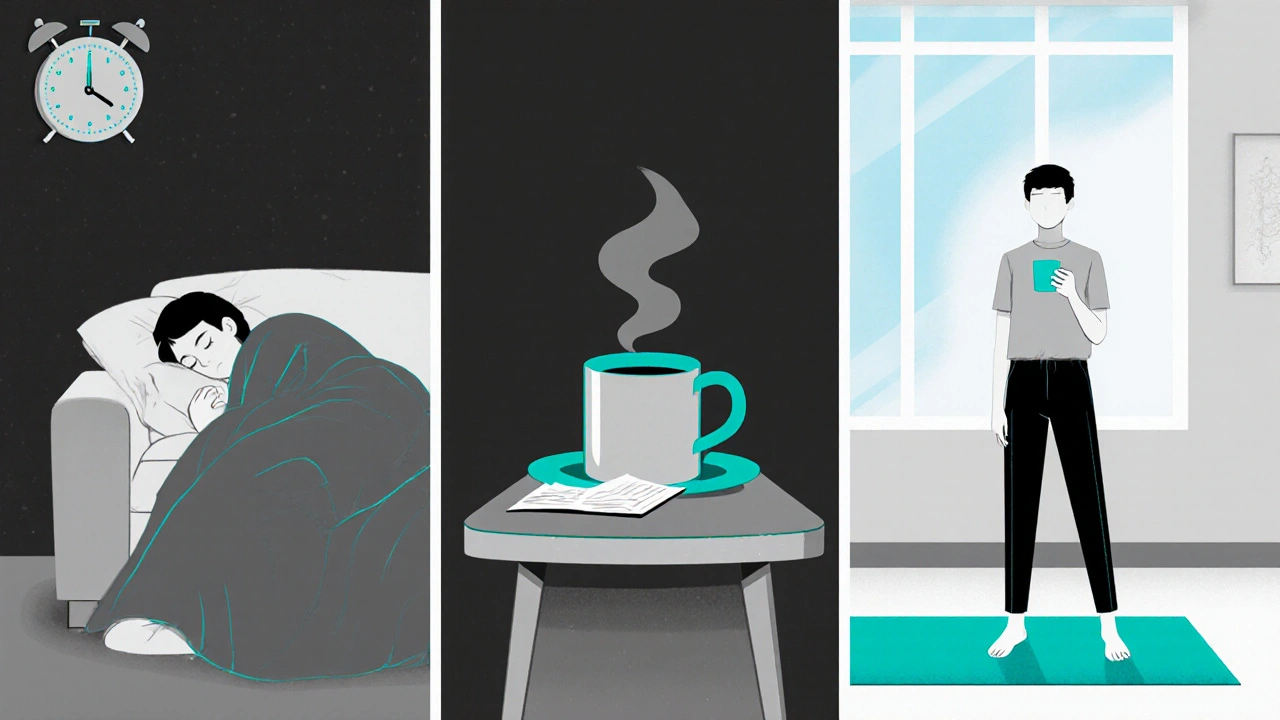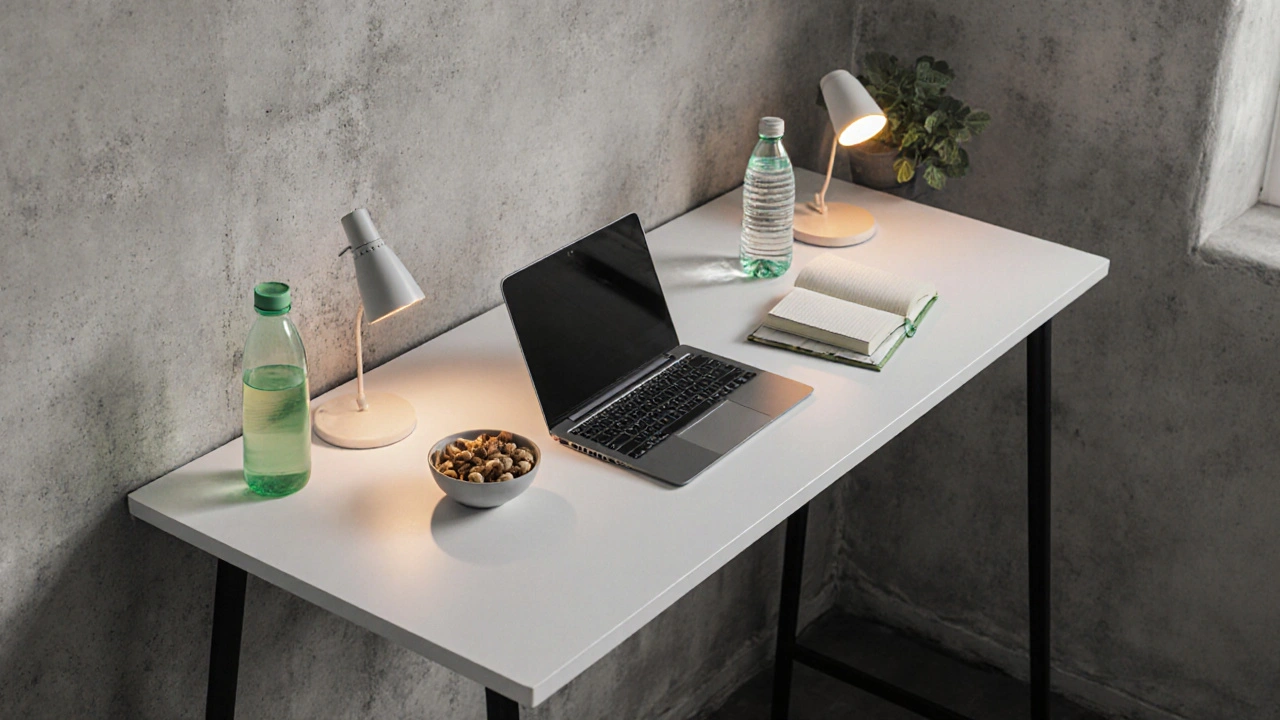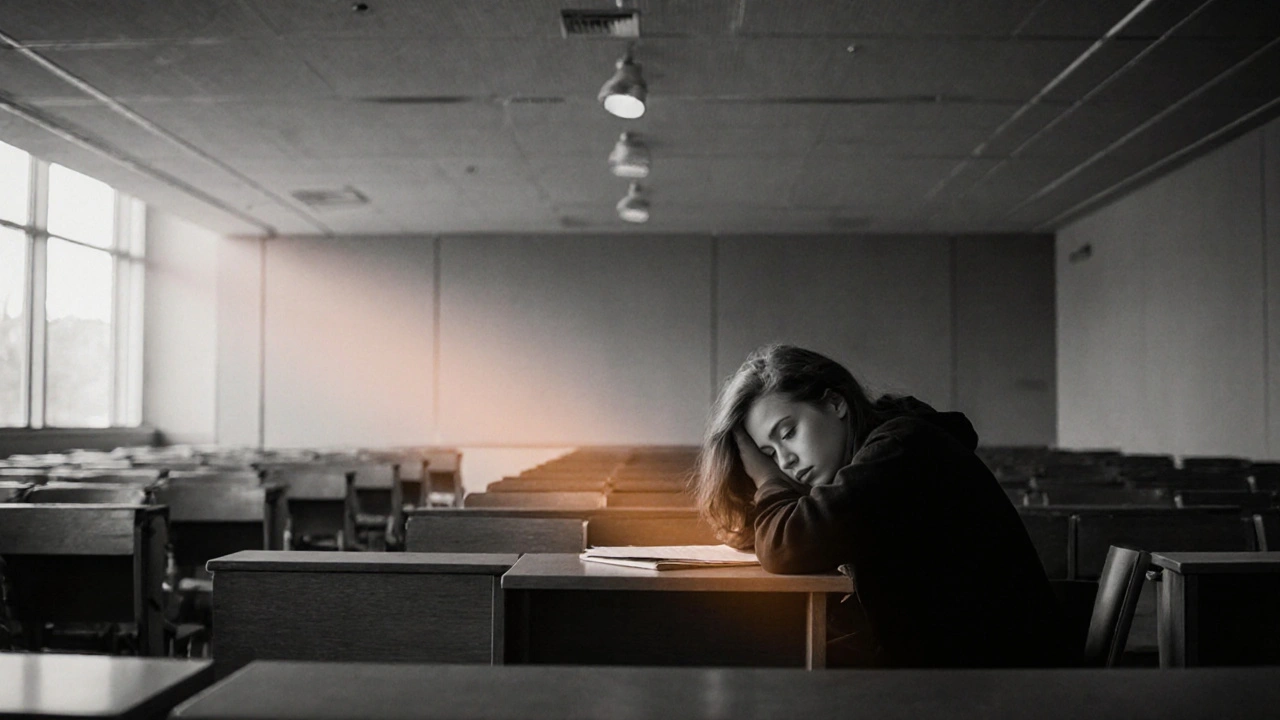Power Nap Calculator
Optimize Your Energy with Strategic Napping
Based on college sleep science, this tool helps you time your naps for maximum alertness without grogginess. Perfect for students needing a midday recharge.
Enter your schedule to see your optimal nap timing recommendations.
Pro Tip
According to sleep science, naps longer than 30 minutes can cause sleep inertia (grogginess). For maximum alertness, aim for 10-20 minutes!
Feeling dragged down by sleepiness during lectures or late‑night study sessions is a common nightmare for many college students. The good news? You can reclaim your energy and concentration with practical, science‑backed habits that fit a busy student schedule.
Quick Takeaways
- Align your sleep window with your natural circadian rhythm.
- Use caffeine strategically - timing matters more than amount.
- Short power naps (10‑20min) boost alertness without grogginess.
- Control light exposure: bright light in the morning, blue‑light filters at night.
- Stay active, hydrated, and eat balanced snacks to fuel the brain.
Understanding Why College Students Get Sleepy
College life often means irregular schedules, late‑night coursework, and social events that push bedtime later each night. This pattern clashes with the body’s Circadian Rhythm is the internal 24‑hour clock that regulates sleep‑wake cycles, hormone release, and body temperature. When you study at 2am and then attend a 9am lecture, you’re forcing your circadian rhythm into a misaligned state, which spikes sleep pressure and reduces alertness.
In addition, stress hormones like cortisol can keep you wired at night, while the accumulated sleep debt during the week makes it harder to stay focused during daytime classes.
How Sleep Impacts Cognitive Performance
Research from the National Sleep Foundation shows that each hour of sleep lost reduces attention span by roughly 15%. Memory consolidation, problem‑solving ability, and reaction time all suffer when you operate on less than 7hours of sleep per night. For college students, this translates to lower grades, missed deadlines, and a higher risk of burnout.

Practical Strategies to Stay Focused and Energized
1. Optimize Your Sleep Schedule
Even if you can’t hit a perfect 8‑hour block, try to keep bedtime and wake‑time consistent within a 30‑minute window. This steadiness reinforces your Circadian Rhythm and reduces the “second‑wind” crash that many students feel after pulling an all‑night study binge.
Tip: aim for 6‑9hours per night, and if possible, schedule a 90‑minute sleep cycle (e.g., 7:30pm‑9:00pm) before an early lecture.
2. Use Caffeine Wisely
Caffeine is a stimulant that blocks adenosine receptors, temporarily reducing the feeling of fatigue. The key is timing: consume caffeine no later than 6hours before you plan to sleep. A typical 200mg dose (about an 8‑oz coffee) can sharpen focus for 3‑5hours, but excess intake leads to jitteriness and poorer sleep quality.
Practical tip: pair caffeine with a short learning burst - for example, drink a coffee right before a 45‑minute review session, then switch to water during the next hour.
3. Power Naps: The 10‑20‑Minute Miracle
Short naps between 10 and 20minutes boost alertness without entering deep sleep, which avoids sleep inertia. Set an alarm, find a quiet spot, and lie down with a light blanket. If you need a longer recharge, a 90‑minute nap allows a full sleep cycle, but plan it early in the afternoon to prevent interference with nighttime sleep.
4. Manage Light Exposure
Bright, natural light in the morning signals the brain to stay awake, while dim, blue‑light‑filtered environments in the evening cue melatonin production. Use a desk lamp with a warm hue for late‑night study, or install a blue‑light filter app on your devices.
5. Move Your Body Regularly
Physical activity raises heart rate, increases oxygen flow to the brain, and releases endorphins that improve mood and alertness. Even a 5‑minute brisk walk or a series of jumping jacks between study blocks can reset your energy levels.
6. Nutrition and Hydration
Blood sugar spikes and crashes are major contributors to mid‑day drowsiness. Choose low‑glycemic snacks like nuts, Greek yogurt, or fruit with protein. Staying hydrated is equally vital-dehydration of just 2% can impair concentration. Keep a reusable water bottle on your desk and sip regularly.
7. Stress Management Techniques
High stress raises cortisol, which can fragment sleep and increase daytime fatigue. Incorporate quick stress‑relief practices such as deep‑breathing (4‑7‑8 technique), mindfulness meditation, or a 2‑minute gratitude journal entry before bed.
8. Create an Energizing Study Environment
A clutter‑free, well‑ventilated space reduces mental fatigue. Use a standing desk or a balance ball chair for short periods to keep muscles active. A subtle scent of peppermint or citrus can also heighten alertness.
Quick‑Reference Comparison of Energy‑Boosting Techniques
| Method | Typical Duration | Primary Benefits | Potential Drawbacks |
|---|---|---|---|
| Strategic Caffeine | 30‑60min after intake | Improved focus, faster reaction | Jitters, possible sleep disruption |
| Power Nap | 10‑20min | Immediate alertness boost | Requires quiet space; risk of oversleeping |
| Short Exercise Burst | 5‑10min | Increased blood flow, mood lift | May need shower/change afterward |
| Hydration & Snack | Ongoing (5‑10min per refill) | Stable glucose, prevents fatigue | Frequent trips to kitchen/cafeteria |
| Blue‑Light Reduction | Evening (2‑3h before bed) | Better melatonin production | May affect screen visibility |
Checklist: Daily Routine to Minimize Sleepiness
- Wake up at the same time each day (within 30min variance).
- Expose yourself to natural light for 10‑15minutes.
- Eat a protein‑rich breakfast (e.g., eggs, oatmeal with nuts).
- Schedule a 10‑minute movement break every 90minutes of study.
- Limit caffeine to one 200mg dose before 2pm.
- Take a 10‑minute power nap if you feel a dip after lunch.
- Drink at least 2liters of water throughout the day.
- Use a blue‑light filter on all devices after 9pm.
- Finish major studying 1‑2hours before bedtime.
- Practice a 5‑minute relaxation routine before sleep.

Common Pitfalls and How to Avoid Them
Overscheduling naps: Napping longer than 30minutes can push you into deep sleep, leaving you groggy. Stick to the 10‑20minute window unless you’re taking a full 90‑minute cycle.
Relying on caffeine alone: Using caffeine as a crutch masks underlying sleep debt. Pair it with a consistent sleep routine.
Skipping meals: Skipping breakfast or lunch causes blood sugar crashes, amplifying fatigue. Even a quick fruit and nut snack helps.
Studying in bed: Your brain links the bed with wakefulness, making it harder to unwind at night. Keep the study area separate from sleeping space.
When to Seek Professional Help
If you consistently get less than 5hours of sleep, feel extreme daytime sleepiness, or notice mood swings, it may be time to talk to a healthcare provider. Underlying conditions such as sleep apnea, narcolepsy, or depression can exacerbate fatigue and require medical attention.
Frequently Asked Questions
How many hours of sleep do college students really need?
The National Sleep Foundation recommends 7‑9hours for young adults, but most students function reasonably well with 6‑8hours if the sleep is high‑quality and consistent.
Is it okay to drink coffee right before a night study session?
A small dose (around 100mg) can improve alertness, but avoid caffeine within 6hours of your intended bedtime to prevent sleep disruption.
What’s the best length for a power nap?
Aim for 10‑20minutes. This duration restores alertness without entering deep sleep, which can cause grogginess.
Can exercise right before a lecture hurt concentration?
A moderate burst (5‑10minutes) usually boosts focus. Intense workouts may leave you fatigued; schedule those earlier in the day.
How does blue‑light affect sleepiness?
Blue‑light suppresses melatonin, delaying sleep onset. Using a blue‑light filter after sunset helps the body prepare for rest, reducing next‑day sleepiness.

All Comments
Kevin Adams October 16, 2025
Picture this: you’re mid‑lecture, eyes glazing over, and suddenly the room feels like a foggy swamp-*that* is the tyranny of mis‑aligned circadian beats! Forget the hype, the real hack is syncing your grind with nature’s clock, not just guzzling espresso till your heart bounces off the walls!!!
Steve Holmes October 23, 2025
Hey folks, totally agree-setting a consistent bedtime window (even if it’s just a 30‑minute band) can seriously level up your focus. Pair that with a quick 5‑minute walk between study blocks and you’ll notice the brain staying razor‑sharp all day. Keep it simple, keep it steady!
Emily Rankin October 30, 2025
Imagine your mind as a garden, each thought a seed waiting for the right sunlight to blossom. When you deprive it of proper rest, those seeds wither beneath the weight of fatigue, and the whole landscape turns barren. A steady sleep schedule is the gentle rain that coaxed those seedlings toward the sky. By aligning your bedtime with the sun’s rise, you let nature itself be the metronome of your concentration.
Think of caffeine as a fleeting spark: it ignites a brief flare of alertness, but without the grounding rhythm of quality sleep, that blaze fades into a smoldering ache. A power nap, in contrast, is a swift breeze that refreshes the leaves without uprooting the whole plant. Ten to twenty minutes is enough to re‑energize the chlorophyll of your brain without the groggy fog of deep sleep.
Movement, too, is the wind that circulates the air-those five‑minute bursts of jumping jacks or a brisk hallway stroll keep the blood pumping and the thoughts circulating. Hydration is the soil’s moisture; a dry brain can’t conduct the electrical signals that power cognition. So sip that water like you’d water a thirsty cactus in the desert.
Nutrition acts as fertilizer-low‑glycemic snacks such as nuts, Greek yogurt, or an apple with peanut butter feed the brain a steady stream of glucose, avoiding those dreaded crash‑and‑burn episodes. Light exposure is the sunrise that tells your inner clock it’s time to awaken; bright morning light and dim, blue‑light‑filtered evenings are the yin and yang of alertness.
When stress tries to suffocate the garden, deep breaths, a quick gratitude note, or a minute of mindfulness are the pruning shears that keep the overgrowth at bay. In the end, it isn’t about chasing endless caffeine or pulling all‑night marathons; it’s about cultivating a harmonious routine where each element supports the other, letting your mind flourish like a well‑tended orchard.
Chris Beck November 6, 2025
That poetic garden talk is nice but reality bites: you can’t just “water your brain” when labs, jobs, and rent eat your time. Most students will skip the nap or the walk because there’s literally nowhere to hide a blanket. Bottom line: the advice is fluffy, not functional.
Roberta Makaravage November 13, 2025
🚀 Let’s get straight to the point: the science is crystal clear-consistent sleep beats caffeine any day. Skipping those 6‑8 hours is like running a car on empty; no amount of fuel will fix the engine.💡
Nickolas Mark Ewald November 20, 2025
Good point, stick to the basics.
Rebecca Mitchell November 27, 2025
Quick tip: keep a spare water bottle in your backpack so you don’t forget to hydrate during long study sessions.
CHIRAG AGARWAL December 4, 2025
Honestly, who has time for a “quiet spot” when the library is a warzone of laptops and whispers? Your power‑nap plan sounds ideal but in practice it’s just another stressor-finding a spot, setting an alarm, worrying you’ll miss class. It’s a luxury, not a solution.
genevieve gaudet December 11, 2025
From a cultural angle, many societies traditionally take a siesta or mid‑day break, which shows that stepping away from work isn’t just a modern fad-it’s embedded in human rhythm. Adapting that mindset can help us reject the “always‑on” mentality that fuels burnout.
Katie Henry December 18, 2025
Dear fellow scholars, it is with utmost enthusiasm that I implore you to heed the timeless virtues of regular sleep, structured hydration, and measured caffeine consumption. Your academic pursuits shall undoubtedly prosper under such disciplined stewardship.
Lauren Sproule December 25, 2025
Thanks for the formal reminder-basically, just try to get enough sleep and drink water, and you’ll feel better.
Joanna Mensch January 1, 2026
Don’t forget that the “research” about circadian rhythms is often funded by big pharma-just another ploy to get us to buy their patented sleep‑aid gadgets while they hide the natural solutions.
RJ Samuel January 8, 2026
While some claim the sleep industry is a conspiracy, the data from independent labs still points to the same benefits of regular rest. So maybe the truth lies somewhere in between.
Sara Werb January 15, 2026
Listen up! All this “balanced snack” nonsense is just a distraction while the elite control our caffeine supply! If you’re not drinking the black‑market brew, you’re being silenced!!!
Winston Bar January 22, 2026
Everyone’s acting like they’re holy guardians of health, but honestly the whole routine is a boring grind. I’d rather binge‑watch a series than count my water intake.
Patricia Echegaray January 28, 2026
Exactly, the so‑called “science” is a smokescreen-big corporations hide the fact that a simple dark‑room and no screens at night can hack the system without their pricey gadgets. Wake up, people, the truth is out there!